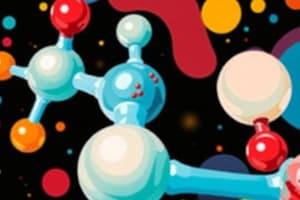Podcast
Questions and Answers
What is matter?
What is matter?
Anything that has mass and occupies space.
What is chemistry?
What is chemistry?
The study of the composition of matter.
What is organic chemistry?
What is organic chemistry?
The study of compounds containing carbon.
What is inorganic chemistry?
What is inorganic chemistry?
What is biochemistry?
What is biochemistry?
What is analytical chemistry?
What is analytical chemistry?
What is physical chemistry?
What is physical chemistry?
What is pure chemistry?
What is pure chemistry?
What is applied chemistry?
What is applied chemistry?
What is technology in the context of chemistry?
What is technology in the context of chemistry?
What does macroscopic mean?
What does macroscopic mean?
What does microscopic refer to?
What does microscopic refer to?
What is biotechnology?
What is biotechnology?
What is a pollutant?
What is a pollutant?
What is the scientific method?
What is the scientific method?
What is an observation in science?
What is an observation in science?
What is a hypothesis?
What is a hypothesis?
What is an experiment?
What is an experiment?
What is a manipulated variable?
What is a manipulated variable?
What is a responding variable?
What is a responding variable?
What is a theory?
What is a theory?
What is a scientific law?
What is a scientific law?
Flashcards are hidden until you start studying
Study Notes
Chemistry Vocabulary Study Notes
-
Matter: Anything that has mass and occupies space, fundamental to understanding chemical concepts.
-
Chemistry: The branch of science focused on the composition, structure, properties, and changes of matter.
-
Organic Chemistry: Specializes in studying compounds that contain carbon, integral in pharmaceuticals and biological applications.
-
Inorganic Chemistry: Focuses on substances generally lacking carbon, including metals, minerals, and organometallic compounds.
-
Biochemistry: Examines the chemical processes and substances occurring within living organisms, bridging biology and chemistry.
-
Analytical Chemistry: Concerned with the composition of materials, using techniques to determine quantitative and qualitative properties.
-
Physical Chemistry: Investigates the physical principles underlying chemical interactions, including energy transfer and reaction mechanisms.
-
Pure Chemistry: Engages in the pursuit of chemical knowledge purely for intellectual curiosity, without immediate practical application.
-
Applied Chemistry: Directs research towards practical goals, often used to solve specific problems or develop new technologies.
-
Technology: Refers to the tools and methods developed by society to fulfill needs and desires, closely linked to advancements in chemistry.
-
Macroscopic: Refers to objects or phenomena large enough to observe without aid; critical for initial chemical observations and experiments.
-
Microscopic: Describes entities that require magnification to view, essential for understanding molecular structures and reactions.
-
Biotechnology: Integrates scientific principles with biological processes to create products and technologies that improve quality of life.
-
Pollutant: Harmful materials present in the environment (air, water, soil) that pose risks to health and ecosystems.
-
Scientific Method: Systematic approach for investigating phenomena, involving observation, hypothesis formulation, experimentation, and theory development.
-
Observation: Involves gathering data using the senses, often requiring measurements for accuracy and reproducibility in scientific inquiry.
-
Hypothesis: A tentative explanation proposed for observations, forming a basis for further investigation and experimentation.
-
Experiment: A structured procedure designed to test a hypothesis; must be repeatable to validate findings.
-
Manipulated Variable: The independent variable in an experiment that is altered to observe its effects on the responding variable.
-
Responding Variable: The dependent variable that is measured and observed in response to changes made in the manipulated variable.
-
Theory: A well-supported explanation that encompasses a broad range of observations, gained through extensive experimental evidence.
-
Scientific Law: A concise statement summarizing consistent results from multiple observations and experiments, often expressed mathematically.
Studying That Suits You
Use AI to generate personalized quizzes and flashcards to suit your learning preferences.




